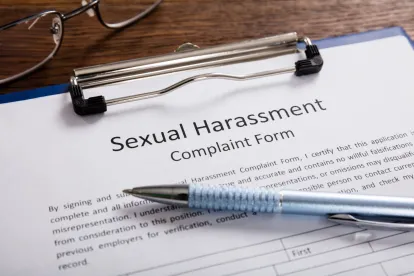As the #MeToo movement continues to sweep the country, on August 9, 2019, Governor J.B. Pritzker signed into law Illinois Senate Bill 75 (now Public Act 101-0221) which will mandate statewide sexual harassment training for employers in Illinois and add other obligations and restrictions aimed at curbing sexual harassment and discrimination in the workplace.
Taking effect in just a few short months, the Act will require at least some policy, practice, and contract revisions by virtually all Illinois employers.
Substantively, Senate Bill 75 amends the Illinois Human Rights Act (IHRA) and the Victims’ Economic Security and Safety Act (VESSA) in numerous significant ways, and enacts the Workplace Transparency Act (WTA) and Hotel and Casino Employee Safety Act.
Unless otherwise noted, these amendments and new laws take effect January 1, 2020.
Illinois Human Rights Act Amendments
Senate Bill 75 adds the following provisions to the IHRA, which are applicable to most Illinois employers. The amendments may also apply in some cases to non-Illinois employers that have telecommuters or remote employees located in Illinois.
Sexual Harassment Prevention Training
The Illinois Department of Human Rights (IDHR) will be required to produce a model sexual harassment prevention training program aimed at the prevention of sexual harassment in the workplace, which will be made available on the IDHR’s website once completed. Similar to existing laws in California and New York, the model program must include, at a minimum:
-
An explanation of sexual harassment under the IHRA
-
Examples of conduct that constitutes unlawful sexual harassment
-
A summary of relevant federal and state statutory provisions concerning sexual harassment, including remedies available to victims of sexual harassment
-
A summary of employer responsibilities concerning the prevention, investigation, and corrective measures of sexual harassment.
Once the IDHR posts this model program, all Illinois employers must either use the model sexual harassment prevention training program to train its workforce or establish its own policy that is equivalent to or exceeds the minimum standards applicable under the model policy. This training must be provided by employers at least once a year to all employees.
If an employer fails to comply, it will be issued a notice to show cause giving it 30 days to comply, with a failure to do so resulting in a civil penalty of $1,000 for a first offense, $3,000 for a second offense, and $5,000 for a third or any subsequent offense.
Employer Disclosure Requirements
Beginning July 1, 2020, and by each July 1 thereafter until 2030, employers with an adverse judgment or administrative ruling in the preceding calendar year in which there was a finding of sexual harassment or unlawful discrimination under the IHRA, Title VII, or any other federal, state or local law prohibiting sexual harassment or discrimination must annually disclose to the IDHR the following:
-
The number of adverse judgments or administrative rulings during the preceding year
-
Whether equitable relief was ordered
-
How many such judgments or rulings occurred in each of the discrete protected characteristics under the IHRA
Additionally, if the IDHR is investigating a charge of discrimination, it may require the employer responding to the charge to submit the total number of settlements entered into during the preceding five years related to sexual harassment or unlawful discrimination.
Data reported by employers is deemed confidential under the law and is not subject to Freedom of Information Act requests or third-party requests. Using this data, the IDHR will publish an annual report aggregating the information reported without disclosing the identity of any individual employer to the public.
Employers found to have violated this section of the IHRA will be assessed a civil penalty of $1,000 for a first offense, $3,000 for a second offense, and $5,000 for a third or any subsequent offense.
Expanded Definition of “Harassment”
In one particularly notable expansion, the IHRA amendments expand the definition of “harassment” by clarifying that harassment of non-employees – such as contractors and consultants – is covered under the definition of “harassment” under the Act. The amendments also alter the definition of “working environment” to clarify that it is not limited to the physical location where an employee is assigned to perform his or her job duties.
The amendments expressly limit liability for harassment by non-managerial and non-supervisory employees to only those cases where the employer becomes aware of the conduct and fails to take reasonable corrective measures.
Court Proceedings
The IHRA amendments detail certain procedures whereby the IDHR must dismiss an IHRA complaint and issue a right to sue upon the filing of a lawsuit. Specifically, if a charging party initiates a federal or state court action seeking relief on some or all of the same issues that form the basis of a charge pending with the Illinois Human Rights Commission, upon request by either party to the lawsuit within ten business days of the IDHR’s receipt of the federal or state complaint, the IDHR must dismiss the IHRA complaint and provide the complainant a notice of right to sue.
The charging party would then have 30 days after his or her receipt of the administrative dismissal to file for review of the dismissal by the Commission.
Victims’ Economic Security and Safety Act Amendments
Senate Bill 75 also amends VESSA to add “Gender Violence” as a protected category under the Act. VESSA requires employers to grant leave to employees to seek care or attend court proceedings for themselves or a family member who is the victim of domestic or sexual violence. Under the amendments, “gender violence” is defined as a criminal offense that is committed “at least in part, on the basis of a person’s actual or perceived sex or gender.” This addition appears to be intended to capture violence against an individual on the basis of sexual identity, such as transgender individuals, and would require that an employer grant impacted employees leave to seek care or attend court proceedings for themselves or a family member if they qualify under this expanded definition of domestic and sexual violence under VESSA.
Workplace Transparency Act Created
Senate Bill 75 also creates the WTA which impacts the enforceability of certain waiver, arbitration, and confidentiality provisions in employment, separation, and settlement agreements. The WTA applies to contracts “entered into, modified, or extended on or after the effective date of this Act,” or on or after August 9, 2019.
The WTA prohibits employers from restricting prospective, current, or former employees from reporting allegations of “unlawful employment practices” which are defined as “any form of unlawful discrimination, harassment, or retaliation.” Such provisions are allowed under the WTA if the employer and prospective, current, or former employee mutually agree in writing and where the written agreement demonstrates an “actual, knowing, and bargained-for consideration” for the otherwise barred provisions and explicitly acknowledges the employee’s right to report any unlawful employment practices to government agencies and comply with any other legal process. Any employment agreement that fails to comply with these limitations is presumed to be unilateral and void as against public policy.
The WTA does still permit the inclusion of confidentiality provisions in employment, separation, or settlement agreements “that includes promises of confidentiality related to alleged unlawful employment practices” provided that:
-
Confidentiality is the documented preference of the employee and is mutually beneficial to both parties.
-
The employer notifies the employee in writing of his or her right to have an attorney review the agreement.
-
The inclusion of the confidentiality provision is accompanied by valid, bargained for consideration.
-
The agreement does not waive any claims of unlawful employment practices that accrue after the execution of the agreement.
-
The employee is given 21 days to consider the agreement before signing it.
-
Unless knowingly and voluntarily waived, the employee has seven days following the execution of the agreement to revoke their agreement.
The WTA provides that a prospective, current, or former employee may recover attorneys’ fees and costs incurred in challenging a contract that violates the Act if the contract is ultimately found unenforceable.
The WTA does not restrict employers from requiring any of the following persons to maintain confidentiality of allegations of unlawful employment practices made by others:
-
Employees who receive complaints or investigate allegations related to unlawful employment practices as part of their assigned job duties
-
An employee or third party who is notified and requested to participate in an open and ongoing investigation into alleged unlawful employment practices and is requested to maintain confidentiality during the pendency of the investigation
-
An employee who receives attorney work-product or attorney-client privileged communications as part of a claim involving unlawful employment practices
-
Any individual covered by a legal privilege
-
Any third party engaged by the employer to investigate alleged unlawful employment practices
Hotel and Casino Employee Safety Act
Senate Bill 75 also creates the Hotel and Casino Employee Safety Act, which requires employers in the hotel and gaming industries to equip employees who work in an isolated environment (e.g., in a guest room, restroom, or casino floor) with a notification device – at the employer’s expense – that will alert hotel or casino security or management that the employee is in need of immediate assistance if the employee “reasonably believes that an ongoing crime, sexual harassment, sexual assault, or other emergency is occurring in the employee’s presence.”
The Act also requires that each hotel or casino employer “develop, maintain, and comply with a written anti-sexual harassment policy to protect employees against sexual assault and sexual harassment by guests.”
Key Takeaways for Illinois Employers
On the basis of these substantial new requirements and restrictions aimed at curbing sexual harassment and discrimination in the workplace and increasing the scope of information that may become publicly available, impacted employers need to immediately review their anti-harassment, anti-discrimination, and confidentiality policies and procedures for compliance. In addition, existing training, reporting, and investigation procedures also should be promptly reviewed for compliance. Employment contracts, including severance agreements, also should be reviewed.
Most provisions of the Act become effective January 1, 2020, and thus require Illinois employers to act quickly. Nearly all Illinois employers will undoubtedly need to undertake at least some type of policy, practice, training, or contract revisions to comply.




 />i
/>i

